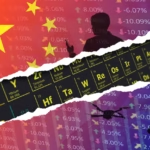BANGKOK – In August 2025, Thai officials began tightening reviews of exporters’ business records to keep a newly approved 19% tariff rate with the United States. This change addresses worries that some Chinese companies are routing goods through Thailand to dodge US tariffs.
Thailand faces rising concerns about Chinese products flooding its markets and an increase in Chinese-owned businesses, which threaten both local companies and the country’s important partnership with the US.
The Department of Foreign Trade (DFT) is stepping up checks on export paperwork for 65 goods groups spanning 224 tariff categories. This step is meant to stop Chinese products from being labelled as Thai and entering the US under false claims.
The US now represents 18% of all Thai exports, giving Thailand a trade surplus of $41.5 billion in the first eleven months of last year. The reduced 19% tariff, down from a possible 36%, relies on Thailand’s ability to prove goods are truly of Thai origin, as set out in recent agreements.
DFT Director-General Arada Fuangthong has directed teams to inspect factories, use X-ray checks at ports and cross-check company registrations. These efforts respond to the US’s call for proof that Chinese firms are not abusing the Thailand-China free trade agreement to reroute goods and skirt US tariffs.
DFT Deputy Director Channingtong noted that this work is only starting, stressing the importance of strict checks.
Chinese Imports Affect Thai Manufacturers
Cheap Chinese imports continue to squeeze Thai manufacturers. Key industries like steel, plastics, electronics and textiles are hit the hardest, with factory output dropping to 56% of normal and car sales slipping lower.
The Federation of Thai Industries (FTI) warns that US tariffs combined with Chinese imports could cost local firms between 800 and 900 billion baht in lost income.
Chinese businesses are sending more goods through Thailand, using the free trade deal that wipes out tariffs on some imports. Thai makers are worried, as more low-priced goods undercut their sales. FTI chairman Kriengkrai Thiennukul has asked the government to step in, suggesting anti-dumping duties and higher local content rules for products.
The number of Chinese nationals opening businesses in Thailand keeps climbing, especially in manufacturing and shipping. The Department of Business Development’s e-Foreign Business system has seen a 97% spike in online sign-ups since October 2023, largely from Chinese investors.
While the system speeds up applications, it has also raised doubts. Some Chinese companies may be setting up shop mainly to get Certificates of Origin, which let them re-export goods to the US as though the goods are Thai-made.
The FTI has flagged cases where Chinese companies import goods to Thailand, claim Thai origin, and then export them to the US. This practice puts Thailand’s reputation as a reliable trade partner at risk.
In reply, the Ministry of Commerce now manages all origin certificates for US exports and works closely with US Customs on product checks and shared inspections. Prime Minister Paetongtarn Shinawatra has put the DFT in charge of certifying exports and is considering tougher penalties for mislabelled goods.
US-Thailand Trade Partnership Faces Pressure
The US-Thailand partnership, built on decades of close trade and diplomacy, faces new strains. The US buys more Thai goods than any other country, and recent talks led by Finance Minister Pichai Chunhavajira locked in a competitive 19% tariff.
This deal puts Thailand on par with Indonesia and the Philippines. Thailand has also grown its US purchases, buying more farm goods and Boeing planes, and has opened up 90% of US products to a duty-free status.
Still, the US wants tighter controls to stop goods from being rerouted through Thailand. Closer cooperation is underway between the US and Thai border agencies, including joint checks and regular communication. Strict Thai inspections seem to be working—only two cases of false origin claims remain, and US checks on Thai shipments have dropped from ten to six types of products.
Thailand’s leaders walk a fine line, aiming to shield homegrown firms from cheap imports without upsetting US partners. The Board of Investment (BOI) plans to update investment rules to favour local manufacturers and lessen dependence on US buyers, with changes expected as soon as May 2025.
The Joint Standing Committee on Commerce, Industry and Banking has called for a special team to oversee issues tied to US-China trade tensions and suggests teaming up with Chinese firms to weather new tariffs.
As global trade disputes drag on, Thailand hopes stronger checks and balanced policies will keep exports safe and maintain US market access. Forecasts show modest economic growth this year, somewhere between 2.4% and 2.9%. Confidence is mixed, but authorities remain alert to threats from cheap Chinese imports and trade rule violations.
Thai businesses must stick to international trade rules to hold on to the gains from recent US trade deals. Prime Minister Shinawatra says there’s no need for alarm about US tariffs. She points out that Thailand has set measures in motion and has a capable team handling talks for better terms.














